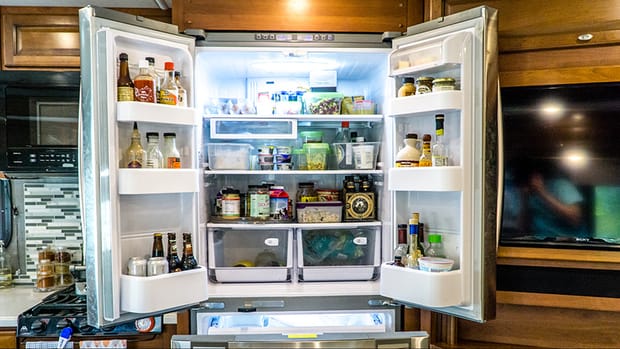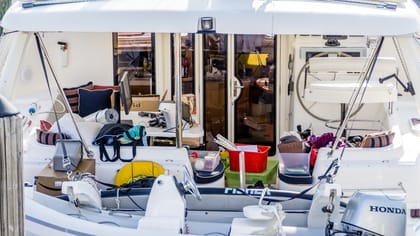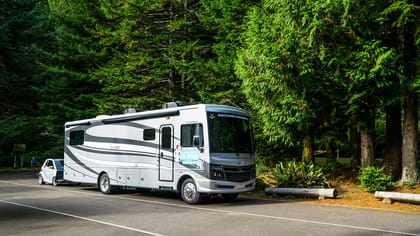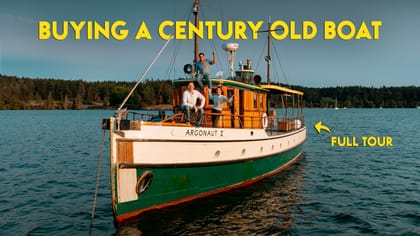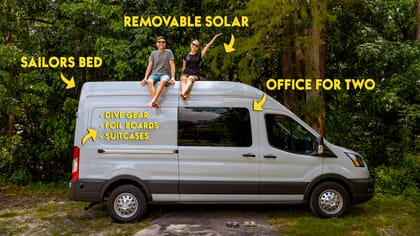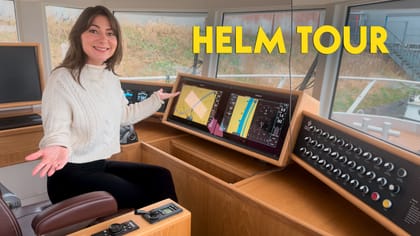Deciding between a Residential Refrigerator or an RV “2-Way or 3-Way” Fridge in a motorhome is a no brainer…at first glance. But if you plan on doing any off the grid boondocking, battery power will be a concern.
You open those big residential fridge doors and there is no comparison! Who doesn’t want more efficient cooling and all that space for fresh and frozen foods!?! In fact, most new RVs are coming directly from the factory with a residential fridge installed, so it must be good…right?
We were so excited when we got the Excursion and it came equipped with a shiny new stainless steel residential refrigerator. However, our minds changed a bit when we hit that first wild camping spot and we decided to park under a canopy of trees. With no power coming in from our flexible solar panels mounted on the roof we were forced to…gasp…run the generator! We began to second guess if a residential fridge was really a good option for an RV or not.
When the time came to build our custom designed Bounder we had the choice again. After deciding to install lithium batteries and the solar AE kit we felt we’d have no problem running that power hog residential fridge in our RV. Sadly, even with all this technology on board we’ve still had to run the generator a couple of times after too many cloudy days in a row.
For the past two years we’ve known the Residential Fridge in our RV uses a lot of power, but we’ve never really monitored the numbers. Today we decided it was time to run the test and educate ourselves so we could better understand our personal power needs.
To be perfectly honest, we also did this test as a way to help us decide how much power we’ll need for our big switch to the sailboat later this year. So, lets dive in to the results.
How Much Power Does a Residential Fridge Use?
Equipment we’re working with:
- Samsung Refrigerator: http://amzn.to/1oeCO0I
- 3000 Watt Hybrid Inverter/Charger: http://amzn.to/1Uvno74
- Battery Monitoring Kit: http://amzn.to/1Uvp9Rt
- 9kWhr (700ah) Lithium Battery Pack: Resurrecting Dinosaurs – Our RV Modifications and Technology
- Kill-A-Watt Meter: http://amzn.to/25r0Do1
Here are the numbers from our test:
- BMK Reading: 200 amp hours in 11 hours
- Kill-A-Watt Reading: 1.530 kwh in 11 hours
If you do the math of converting kilowatts into 12v amp hours you’ll see our fridge only used about 130 amp hours of battery. My answer to this discrepancy: Power is always lost when using an inverter and there are parasitic draws from our battery we cannot control (such as vent fans, LED lights, radio, etc).
I did run a separate test while plugged into shore power with the A/C set to 74° and the fridge pulled 2.392 kwh in 24 hours (1.097 kwh in 11 hours). This tells me when temperatures are a little cooler the fridge doesn’t have to work quite as hard.
I personally think the conditions were perfect for our off the grid RV Fridge Test as it wasn’t too hot and we were in shade (or it was night) for half of the testing hours. The temperature was a mild 80 degrees and there was a slight breeze to keep the air moving inside the motorhome.
It’s also good to note we spent the entire day outside of the RV as we wanted to test only the refrigerator power usage. Our TVs were still plugged in but they were off and the only other thing using electricity was the overhead LED lights for the few minutes while filming inside the coach. We did open the fridge a few times to get stuff for lunch and the occasional beverage, but that’s “real-life use”.
Factory Installed Batteries Won’t Cut It
When installing a residential refrigerator most RV manufacturers will come stock with four 6-volt batteries with 400 amp hours and 200 “usable” amp hours (because you should only drain standard lead acid batteries to 50%). Dealers and salespeople have told us “you can run that fridge for days on these batteries”. Baloney! On our Excursion, before adding solar, we were required to run the generator for a couple hours in the morning and a couple hours in the evening to keep our batteries from dipping below the 50% mark.
Our Real World RV Battery Power Experience
While living full time in an RV you will burn through power more quickly than you ever expect. We’re pretty used to managing our power even though we use more than the average camper! Even though we’re accustomed to balancing our power use, sometimes we get caught off guard when a storm rolls in, or the smog cuts the amount of solar power we’re bringing in.
If we have one day of bad weather, we know to be more conscious of our power usage and monitor it more closely. If the sun sets and we’re at 80% battery, we know we’ll wake up to 65% battery power in the morning. If we get a second day of thick clouds, then we know we’ll be forced to run the generator at night for a couple hours to keep the fridge from bringing the batteries down too low.
You can’t stop the residential fridge, it’s like a freight train that’s always using your power. When Mother Nature doesn’t cooperate with sunny skies we really wish we could turn this power hog off, but we can’t.
Pros and Cons of the RV & Residential Refrigerators
You’ll find your own pros and cons but from our experience with both the two-way RV fridge and the residential fridge here’s our personal opinions:
Residential Fridge
- Pros: Way more capacity. More efficient at maintaining temperature and staying cool under any conditions. Generally, less expensive. Better built in ice makers. No propane flame to worry about catching fire. No drip tray to worry about freezing and clogging. No vent cut-out on the RV exterior sidewall. Less humidity inside the fridge. No pesky “fridge aerator” needed.
- Cons: Most refrigerator manufacturers require a pure sine wave inverter. Inverter must always be left “on” to supply power. Inverters are not 100% efficient, so there will be some ‘lost’ power when inverting the power from 12v to 120v. Needs a lot of battery and solar power to compensate for the power draw.
RV Fridge
- Pros: Technology in conventional RV LP/Electric refrigerators allows you more flexibility because you can switch them to “propane” mode to drastically reduce the power consumption.
- Cons: Not as efficient in higher elevation, humid or hot climates. Takes longer to get cool again once doors have been opened. You have to defrost both the fridge and freezer once every month or two. Have to fill up the RV propane tank more often. Propane flame can be dangerous when the RV is not parked level. Need to regulate internal air flow to ensure the gravity-fed system can keep things cold.
Minimum Power Needed for a Residential Fridge
Again, this is just my opinion based on our experience. When people ask me “How much power do I need to run a residential refrigerator in my RV?” My go to answer is this:
The minimum power for running solely the residential fridge for 24 hours is six AGM batteries totaling 600 amp hours (300 ah usable). PLUS you need 600 watts of solar power on the roof to replenish the batteries during the daylight hours. Remember that is just for the fridge and it doesn’t include other devices you may use in your RV such as kitchen appliances, computers, TVs, Radio, Lights, etc.
Best Power Setup for Off The Grid RV living with a Residential Fridge
If you don’t want to be forced to run a generator I’d say go for 800 amp hours of lithium, or 1200 amp hours of AGM and a solar array like our 960 watt All Electric kit from GoPower!. This should provide enough power to make it through 3 days of “normal” living (6 days if we are conservative) during cloudy weather without being forced to run the generator. Of course if there is full sun then we would be able to run almost anything as if we were plugged into the grid (we could even run our rooftop Air Conditioner for a couple of hours).
Here’s the gear we recommend:
- 960 watt Solar Kit: http://amzn.to/1XWqmiD
- 800 AH of Lithium Battery (check out reputable brands such as Lithionics and Relion)
- 2000 watt (or larger) PureSine Wave Inverter: http://amzn.to/1Uvno74
- Battery Monitoring Kit: http://amzn.to/1Uvp9Rt
- Automatic Generator Start (to ensure you don’t run your batteries down to low): http://amzn.to/21NAXgF
- Kill-A-Watt Meter: http://amzn.to/25r0Do1
Our Verdict – Residential Fridge vs. RV Fridge
Residential fridge all the way with one big ol’ caveat! Upgrade your batteries! If you are adding solar and a beefier battery bank you shouldn’t have much issue keeping up with the power hog that is the residential refrigerator.
I hope us tracking the numbers (and sharing our experiences) is helpful with your decision on whether or not to outfit your rig with a residential fridge or a propane powered RV fridge. If you have any questions, concerns or you want to share your RV fridge (or Tiny House, Sailboat, etc) tips and experiences please do in the comments below, we’d love to hear your thoughts!


